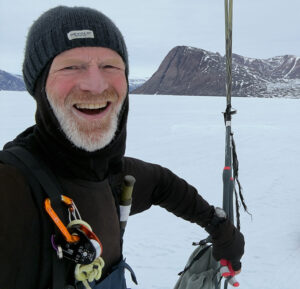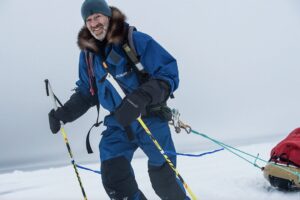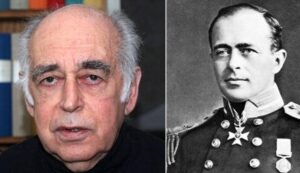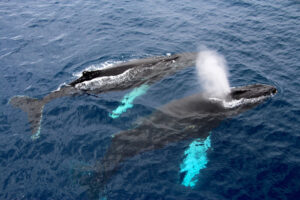After canoeing for 83 days across Labrador and northern Quebec, Justin Barbour ended his attempt to reach Hudson Bay. The Newfoundland schoolteacher and his dog Saku set out from North West River on July 28 and completed 1,000km of the 1,700km expedition.
Barbour’s decision to delay his trip until late July in order to be best man at his friend’s wedding ultimately led to his aborted journey. Toward the end, high winds pinned him down consistently, and an early winter had him slogging through knee-deep snow. Smaller lakes were already beginning to freeze.
“People tell me we’ve had the worst winds for 20 years and the earliest winter in 25 years”, he said. “The temperatures were getting down to -15C to -25C with the wind chill. We had 125kph winds, and I was windbound for six days straight. During the last three weeks of the trip, temperatures got above zero only twice. Sleet and snow storms raging all day, and sitting stationary [in camp] for long periods, is a recipe for hypothermia.”
After paddling for three to four hours at a time in -12C temperatures, Barbour, in fact, suffered the beginnings of hypothermia. “I was like a man who came out of the pub stumbling around with no feeling in my legs. I couldn’t make a fist and had to get a fire started really quick.” he explained. “While I didn’t get frostbite, I did suffer some mild frostnip.”
Barbour believes that if he had made it to the Great Whale River, he could have succeeded. “I lost 28 days due to high winds and I had factored in about 12 to 15,” he said. “I was about 200km from Lake Bienville and had another 50 km to cross that lake to where the Great Whale River begins. Without those delays, I would have made it either to the Great Whale River or the Coates River. While the Coates River has more small lakes that would probably have been frozen over by then, the Great Whale River is a big river with deep, fast currents and probably wouldn’t freeze until January,” he explained.
For the first four weeks of his journey, Barbour made excellent progress, despite a physically challenging climb up the Red Wine River. “It was very dangerous and definitely the toughest part of the trip,” he said. “I did some mild river ascents in Newfoundland last year but had never really done true upriver travel. The Red Wine River was a climb of 2,000 feet in 20km.
“I was 27 days getting to the Smallwood Reservoir and only two days off schedule, mainly due to delays in my first re-supply coming in,” he added. “Half way across Smallwood, the wind really started eating me up. Once the wind gets above 20kph, it’s not suicide but you’re taking really big chances out there.”

Barbour and Saku heading up the Red Wine River. Photo: Justin Barbour
Eventually it was the icing up of the smaller lakes in the Caniapiscau Reservoir system that halted his progress. “I tried to cut across an area of land about 50km wide to get off the Caniapiscau, because the wind was giving me a lot of grief. But as I got into these smaller systems, we had 30cm of snow. I had to portage a few hundred metres over to a smaller lake, which was covered with an inch of ice. I had to break through 200m of ice with my paddle and cracked one of my paddles. I didn’t have a sled or snowshoes in my lineup and would have had to wait another two or three weeks before I could move efficiently with a sled and snowshoes. Flying in winter gear wasn’t feasible, and things were becoming unsafe with the cold in the canoe, so I made the decision to get out of there.”
Even then, Barbour had to wait five more days due to snow and wind, in below-freezing temperatures, until a helicopter was able to airlift him out.

Justin Barbour waiting near the Caniapiscau Reservoir to be airlifted out. Photo: Justin Barbour
Throughout his journey, he supplemented his food supply with game. “Besides my 3,200 calories a day, I ate a fair bit of wild game,” he said. “It was probably 15 percent of my total food supply. Still, I lost 26 pounds, way more than I anticipated. It wasn’t until about seven weeks in when my weight declined. It was the cold weather: You’re burning a lot more energy just to keep warm.”
Now back home in Newfoundland, he is slowly coming to terms with the disappointment of not finishing. “I still look at it as a success. Labrador is probably one of the more inhospitable and desolate places on the planet. To get as far as I did, with the upriver travel, was … more difficult than I thought it would be. That’s the point of these trips. Going out there, testing yourself, formulating a plan and executing it,” he said.
Finally, ExWeb asked Barbour whether he would return later to complete or re-do his route: “I don’t like leaving things unfinished,” he replied. “I’m sure I’ll be back, at the point where I left it. I left a little mark at my last campsite. I’d like to go back this winter, but that’s not going to happen.
“I want to drop the regret from my mind pretty quickly. That can eat you up.”
Links to our earlier articles on Justin Barbour:
Solo Across Labrador and Northern Quebec
Winter Rages, Barbour calls it Quits






